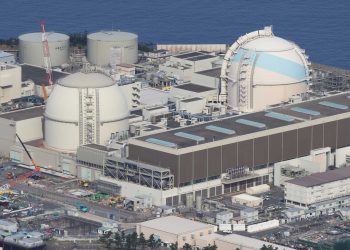Agence France-Presse,
A team of US experts left Tuesday for North Korea to disable the hardline communist state's nuclear weapons arsenal in a crucial phase of a six-nation disarmament pact.
The eight experts would launch the process of “actual disablement” at the key Yongbyon nuclear complex, the source of bomb-grade plutonium for North Korea, which conducted its first atomic weapons test exactly a year ago, officials said.
The experts are expected to reach Pyongyang on Thursday after a stopover in Beijing.
They would stay in North Korea for about a week before another team takes over in a “baton pass,” said Sean McCormack, the State Department spokesman.
North Korea agreed last week to disable by December 31 the main plutonium producing reactor at Yongbyon and two other key nuclear facilities at the complex, which were shut down in July in the first phase of a February six-party agreement.
The United States, a nuclear weapons state, will lead the disablement drive as Pyongyang makes a full declaration of its nuclear network under the deal clinched by China, the United States, Russia, the two Koreas and Japan.
North Korea was promised energy aid as well as diplomatic and security guarantees if it disbands its nuclear weapons drive.
The United States is taking great pains to ensure that North Korea sticks to its plan to declare and disable its nuclear program and eventually dismantle it and surrender all the atomic material.
North Korea previously shut down the Yongbyon reactor under a 1994 agreement clinched during the administration of then president Bill Clinton, but it withdrew from the pact after the Bush administration in 2002 accused it of developing a secret uranium enrichment program.
The North responded by throwing out weapons inspectors, leaving the nuclear Non Proliferation Treaty (NPT) and resuming its atomic activities.
“We don't want a situation like in 2002 … (when) they were able to turn the plant back on in two months time,” said Christopher Hill, the US pointman for the six-party talks, pointing out that there was no disablement then.
“We need many more months and ideally, I'd like to see, you know, around 12 months,” Hill said.
He said the disablement process would “make it difficult” for North Korea to restart its nuclear activities.
“You can take certain components out of the facilities and, for example, take things out of a reactor such that they are not so easy to just put back into the reactor,” he said.
“For example, if you took a battery out of a car and just left the battery next to the car, that would not be real disablement because you could just put the battery right back in the car.
“But let's say you put the battery somewhere else or let's say it's the only battery in town and the battery is disabled slightly on its own, then it becomes more difficult to do,” he said.









